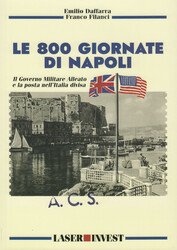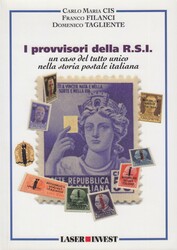Editorial
29.00
EUR
INTERITALIA 2022 Refined Edition
Italian Postal Stationery Specialized Catalogue BILINGUAL:
Italian-English.
COMPLETE SPECIALIZED COLOR EDITION of 432 pages. International
edition: with introduction, descriptions and notes also in
English.
The only catalogue which values AQ sheets, postcards and military
postage tickets (all, and in a rational way), Venezia Giulia and
Tridentina
at the time of Austria, the private overprints, Perfins, Valigia
delle Indie.
The only one with the reproduction of all the illustrations of the
celebratory, advertising and propaganda postcards.
The only one with the stamps reproduced in the natural state, and
with all the details, the maps, the technical, postal and
commercial information necessary for the collector, even novice,
and for the scholar.
The only one signed by the leading Italian experts in the sector,
with the support of UFI-Italy.
The only one truly international, with the texts in Italian and
English.
The changes compared to the previous 2016 edition concern the
prices, a demanding advertising presence that confirms the growing
appreciation of the market for this work, as well as some new
images and specifications.
The real editorial novelty concerns the final part relating to the
Italian postal parcel service, which records the issue of the new
"packages" in paid port, and even a type of "label plate" which,
being self-adhesive, should also be of interest for
stamp-lovers.
As far as valuations are concerned, the traditional prudence of
this catalog has allowed us not to have to touch down many figures.
On the contrary, increases are recorded both for the less available
pieces (which are undoubtedly many in our sector) and for
particularly popular sectors such as advertising items, and for the
more modern part.
And the same "indication" of the market, reasonably tended to the
upside, is put into practice for the first time for a sector such
as the colonial one, especially the shipping slips of the '900,
often unavailable but remained for too long at a 30 years ago, and
which instead sold like hot cakes in recent auctions, even at
fivefold figures.
by Franco Filanci, Carlo Sopracordevole & Domenico Tagliente
125.00
EUR
SASSONE From the Pre-unification States to the Kingdom of Italy
(1859-1862) POSTAL HISTORY. Volume 1 and 2. 1st Edition 1999.
Specialized catalog of 434 + 448 pages showing all the postal rates
for the years from 1859 to 1862.
All the postal rates of the years from 1859 to 1862 are shown,
tables with hundreds of rates, some unpublished, for each Italian
State, for each destination both for internal and external. Each
chapter opens with an in-depth historical introduction, enriched by
numerous maps and portraits of the sovereigns.
by Luigi Sirotti
20.00
EUR
World Soccer Cup stamps
The history of the World Cup lived through the publication and
printing of commemorative stamps, witnesses and symbols of
exceptional sporting events, a surprising expression of a sport
that unites peoples of entire nations, regardless of race,
religious belief or social class.
by Stefano Lucchini, Tommaso Tagliente, Alberto Costa, Cristiana
Lodi.
20.00
EUR
Anthology of Advertising Stamps
The Anthology of advertising stamps is the curious secular journey
and the thousand attempts, albeit sometimes unsuccessful, of those
who also in past centuries proposed to convey, as we now say,
commercial products.
The meeting between mail and advertising is the subject of this
book which, far from being a simple treatise for professionals,
philatelists and collectors of forgotten artifacts, also offers
unexpected implications to the non-specialized reader.
by Stefano Lucchini e Tommaso Tagliente.
12.00
EUR
La Posta dei Comuni
COMPLETE SPECIALIZED COLOR EDITION of 64 pages
It is with the massive use of weapons and powerfully destructive
means that modern war has involved, more and more heavily than in
the past, the life of civil society. It is no longer the titanic
clash between two armies facing each other on the borders as in the
most distant years. The last two world wars of the twentieth
century destroyed countries, entire metropolises, roads, bridges
and railways. By shattering and hindering also the possibility of
communication between people. Yet people's need to interact has
never completely stopped, despite the chaos of the war. The
"reading" of postage stamps and the activity of improvised post
offices, in those hungry and dramatic days, constitute a culturally
very interesting bridge for passing from a "minor" history such as
that of philately to a lively understanding of the great events
that marked the our country. The two world wars upset the borders
of Italy; they transform its territorial structure and, above all,
force Italians to face endless hardships. Among these, isolation,
in fact. In the devastated country, the state mail service reaches
its limit: it works in fits and starts, when it does not even
become paralyzed. The causes of the blackout are many, linked and
inevitably connected to the war scenario. The means of transport
are limited, largely destroyed. Fuel is scarce due to the pressing
demand of the military forces engaged at the front. As if that were
not enough, during the second conflict, the bombings of the allied
forces devastated roads and destroyed bridges, thus making the main
arteries of the peninsula impracticable. Every form of central and
peripheral communication slows down, with postal correspondence
(already slow in nature) paying for it first...
by Tommaso Tagliente e Andrea Frassineti.
14.00
EUR
The Mysteries of Zara
Historical novel and philatelic thriller, "The mysteries of Zara"
by Alessandro Moro with its well thought-out narrative structure,
compelling in the intertwining of love and war, punctual in the
topographical and historical setting, deceives the reader: nobody,
nothing is as it appears . Even "the good hero" has his ghosts and,
despite the scattered clues, the ending is surprising. To make the
plot even more attractive for collectors, concrete references to
their families, such as those of the Trieste trader Sfiligoi, the
Scaligerian Nicodem, or the Venetian Degani.
Winter 1943-44, eastern coast of the Adriatic. At the height of the
Second World War, the historical tragedy of Zadar is consummated.
The Italian enclave is subjected to German occupation, suffers the
attempts of annexation by the Tito partisans, is exhausted by the
exhausting bombings of the Allies. In an atmosphere of "Twilight of
the Gods" strange crimes are perpetrated, investigated by
Lieutenant of the Carabinieri Umberto Favaretto. In the background
are the rare Italian stamps overprinted by the Germans “Deutsche
Besetzung Zara”, the real protagonists of the story.
by Alessandro Moro.
40.00
EUR
Postal History of the Tuscan Railways
Specialized Catalog of 208 color pages with the reproduction of all
the existing stamps of the Tuscan Railways.
This work is the result of the study of thousands of documents
belonging to the great collections of the past and present and is
organized with the cataloging of the various cancellations in
alphabetical order, to allow a quick search even for the less
experienced.
by Fabio Regoli.
14.00
EUR
The 800 days of Naples
The Allied Military Government and the post in divided Italy
In Naples it took four days, albeit terrible, to free itself from
the Germans, but it took 800 to see the end of the Allied Military
Government. Unlike the rest of Italy, which after a more or less
short period was returned to the sovereignty of the Italian
government, Naples was returned to the Italian administration only
on January 1, 1946, together with Upper Italy and some strategic
locations. And from December 1943 to July 1944 due to its position
and its port, Naples was practically the capital of Italy, along
with Salerno. And he saw not a few events at the postal level,
nothing short of unique, such as two allied issues that almost
immediately became Italian in all respects and an emergency stamp
printed in a private establishment.
It is the story told by "The 800 Days of Naples", in which
historical events and postal events, postage stamps of all kinds
and daily emergencies come together to form an exciting, tragic and
human picture. Which shows once more how the post office and
philately, if observed with due attention and without prejudice
(including collectors), can offer an unparalleled historical
documentation, which passes from the political-institutional
interests of the authorities to the small everyday life of the
population , in times of war limited even in the most elementary
rights of family communication.
by Emilio Daffarra e Franco Filanci.
0.00
EUR
(sold)
The provisionals of the R.S.I.
A completely unique case in Italian postal history
The volume presents a finally realistic and postally correct
history of these temporary postage stamps and postal stationery,
which document one of the
the most troubled, anomalous and complex periods in the history of
Italy, when even the tradition of jealous confidentiality that has
always
surrounds the production of postal security cards, having them
overprinted at various printing presses, both governmental and
private.
A story based on precise or at least documentable information on
the sequence of events, on the postal regulations, on the machines
from
printing and the techniques in use, which not only clear the field
of errors and bizarre hypotheses (until it was discovered that even
two postage stamps had the
double edition), but also offer a more concise system for
identifying the origin of these overprints, both on stamps, in the
presence of
sheets, large blocks and even as far as possible loose copies or
documents, whether on postcards, postal cards, money order forms
and
shipping slips, for the first time comprehensively treated. A
concise but comprehensive story, accompanied by enlarged
reproductions
of the various overprints and their colors, which comes from the
union of multiple experiences from historical postal research to
exams
spectrometric control over the philatelic material that fills many
of the gaps still existing in this exciting and very popular
collecting sector.
by Carlo Maria Cis, Franco Filanci e Domenico Tagliente.









